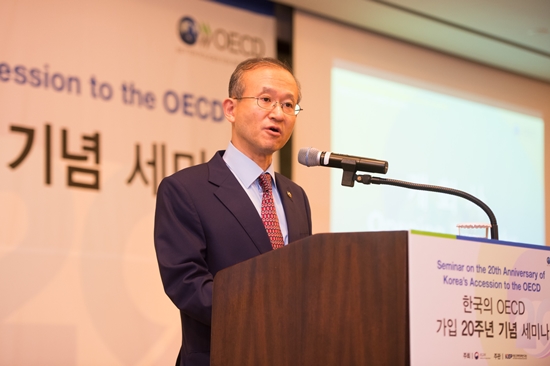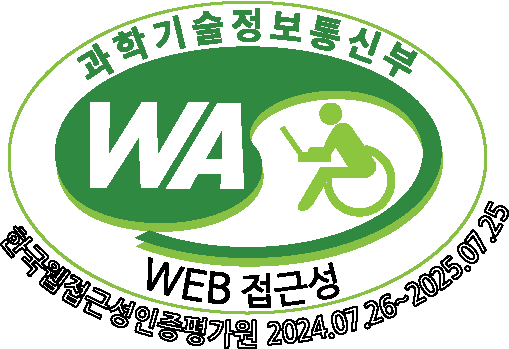1,2차관
제1차관, 우리 OECD 가입 20주년 기념 세미나 개회사
- 부서명
- 작성자
- 작성일
- 2016-10-25
- 조회수
- 4528

Secretary-General Angel Gurria,
Distinguished Participants,
On behalf of H.E. Yun Byung-se, Minister of Foreign Affairs, I would like to warmly welcome all of you in this hall who have come to celebrate the 20th Anniversary of the Republic of Korea’s Accession to the OECD. In particular, let me extend my heartfelt appreciation to Mr. Angel Gurria, Secretary-General of the OECD, and Mr. Phil O’Reilly, Chairman of the OECD Business and Industry Advisory Committee for joining today’s seminar.
Distinguished Guests,
(OECD’s Contribution to Korea’s growth)
Since Korea joined the OECD in 1996, Korea has continued to rise as a full-fledged middle power in the international arena. Throughout this process, the OECD, a group of countries sharing the values of democracy and the free market economy, has made meaningful contributions to Korea’s achievement of pluralistic political institutions and rapid economic progress.
All in all, over the past twenty years, the Korean economy has been upgraded a level further. There is no doubt that in this process the OECD has become the most trusted policy advisor in the eyes of the Korean Government and people.
(Korea’s contribution to the OECD over the last 20 years)
At the same time, Korea, as the OECD’s trusted partner and contributor, has played a leading role in OECD policy discussions on a whole range of issues. Let me highlight a few of the most noteworthy.
First and foremost, development cooperation is a case in point. Since Korea joined the OECD Development Assistance Committee in 2010, it has doubled its efforts to share with other OECD members its experience of developing from an aid recipient into a donor. In the same year, as the host of the G20 Summit, Korea also played a leading role in making development a key item on the agenda for the G20 in close cooperation with the OECD.
Secondly, in the area of climate change, Korea, as Chair of the 2009 OECD Ministerial Council Meeting, contributed greatly to drafting the OECD Green Growth Strategy, spearheading efforts for the adoption of the Declaration on Green Growth.
Thirdly, Korea is also playing a significant role in science and technology. With the OECD, Korea successfully held a Ministerial-level Meeting of the OECD Committee for Scientific and Technological Policy in Daejeon, Korea in 2015 and led discussions on how to use scientific and technological innovation for sustainable development.
(Challenges we are facing)
Distinguished Participants,
We are living in a world of uncertainty, facing a number of daunting challenges. The world is slowly recovering from the aftermath of the financial crisis, but has not yet fully recovered to pre-crisis levels. Like many other countries, Korea has also experienced a slower growth, higher unemployment, and slowdown in productivity.
In particular, the aging population issue that advanced countries commonly face is worsening rapidly in Korea, and therefore we are in the situation of having to urgently come up with appropriate measures. We also need to ponder on solutions for the rising income inequality.
These challenges are interlinked and need to be addressed in a concerted manner. In order to efficiently respond to these challenges, we need a strategic and coordinated policy. In this vein, we believe that the OECD’s leading role is crucial.
(Korea-OECD Cooperation for the Future)
Distinguished Participants,
Korea is fully committed to working closely with the OECD in order to address all these challenges in a proactive manner.
First of all, addressing low growth and productivity slowdown requires structural reform and innovation. During the recent G20 Hangzhou Summit, President Park Geun-hye stressed the importance of boldly carrying out innovation and reform. The Korean Government has been concentrating on carrying out major reform initiatives in four areas: the public, labor, education and financial sectors.
『The OECD Economic Surveys: Korea 2016』 published last May, commends Korea’s continuous efforts for structural reform as one of the key policies for sustainable growth. It is believed that these efforts open a wide window for collaboration between Korea and the OECD.
Secondly, with regard to the fourth Industrial Revolution, which is expected to contribute to enhancing productivity at an unprecedented scale and speed, there is also growing concern about the job losses and increased inequality it might lead to. It is therefore crucial to garner our expertise and wisdom to maximize benefits and minimize negative impacts. In this context, a leading role by the OECD is more important than ever in analyzing the changes of our times and coming up with the right policy choices.
Korea is ready to work together with the OECD in this regard. With its signature policy, the“Creative Economy”, Korea has already prepared for this new era of innovation. As a new engine of growth, the “Creative Economy” is to pursue inclusive and sustainable growth through innovation. Since the OECD has also put an emphasis on innovation, I believe that Korea and the OECD can join hands in seizing the opportunities which the new technological revolution presents.
Last but not least, Korea will contribute to implementing the historic consensus - namely the 2030 Agenda for Sustainable Development. We have been actively participating in the global discussions, including within the OECD, on how to enhance the effectiveness of development cooperation. Korea is keen to share its successful experience in fully implementing the SDGs. And I firmly believe that Korea-OECD collaboration in this area will be enormously expanded in the coming decades.
(Closing)
Distinguished Guests,
In closing, I am pleased to assure all of you that the Korean Government is intent on continuing to work together with the OECD in realizing our shared vision of creating new growth engines through innovation and thereby achieving sustainable growth.
I thank you for your attention. /END/
-------------------------------------(비공식 국문번역본)-------------------------------------
앙헬 구리아 OECD 사무총장님,
그리고 세미나 참석자 여러분,
윤병세 외교부 장관님을 대신해 한국의 OECD 가입 20주년을 기념하기 위해 이 자리에 오신 모든 분들을 진심으로 환영합니다. 특히, 오늘 세미나에 참석하신 「앙헬 구리아」 OECD 사무총장님과 「필 오라일리」 OECD 경제산업자문위원회 회장님께 깊이 감사드립니다.
참석자 여러분,
(한국의 발전에 대한 OECD의 기여)
1996년 OECD에 가입한 이래, 한국은 계속하여 국제사회에 적극적으로 기여하는 성숙한 중견국으로 부상하였습니다. 특히, 민주주의와 자유 시장경제의 가치를 공유하는 국가들의 모임인 OECD는 한국이 다원적 정치 제도와 급속한 경제 성장을 이룩하는 데 의미있는 기여를 해왔습니다.
대체로, 지난 20년간 한국 경제는 한 단계 더 업그레이드 되었습니다. 이러한 한국의 발전 과정에서 OECD가 한국 정부와 국민에게 가장 신뢰할 만한 정책 조언자가 되었다는 점은 부인할 수 없는 사실입니다.
(지난 20년 간 한국의 對OECD 기여)
이와 동시에, 한국은 OECD의 신뢰할 만한 파트너이자 기여자로서 다양한 이슈에 대한 OECD 정책 논의를 주도하고 있습니다. 그 중에서 가장 주목할 만한 몇 가지를 말씀드리고자 합니다.
무엇보다도 개발협력을 예로 들 수 있습니다. 2010년 OECD 개발원조위원회(DAC) 가입 이후 한국은 수원국에서 공여국으로 탈바꿈한 개발경험을 여타 OECD 회원국들과 공유하기 위해 노력을 배가하고 있습니다. 또한 같은 해 G20 정상회의 의장국이었던 한국은 OECD와의 긴밀한 협력을 통해 개발을 G20의 핵심의제로 만드는 데 중요한 역할을 하였습니다.
둘째로, 기후변화 분야에서 한국은 2009년 OECD 각료이사회 의장으로서 녹색성장전략 작성과 녹색성장 선언문을 채택하는데 크게 기여하였습니다.
셋째로, 한국은 과학기술 분야에서도 중요한 역할을 하고 있습니다. 한국은 OECD와 공동으로 작년 대전 과학기술장관회의를 성공적으로 개최하였습니다. 동 회의에서 한국은 지속가능한 발전을 위한 과학기술혁신 활용 방안에 대한 논의를 주도하였습니다.
(우리가 직면한 도전과제)
존경하는 참석자 여러분,
우리는 불확실성의 세상에 살고 있고, 많은 어려운 문제들을 직면하고 있습니다. 세계는 금융위기의 여파에서 천천히 회복하고 있지만, 여전히 위기 전 수준으로 완전히 회복하지 못하고 있습니다. 다른 국가들과 마찬가지로 한국 역시 저성장, 고실업, 생산성 저하 등의 문제를 겪고 있습니다.
특히, 선진국들에게 공통적으로 나타나는 고령화 문제는 한국에서도 빠른 속도로 악화되고 있기 때문에 우리는 신속히 적절한 조치를 마련해야 해야 하는 상황에 놓여 있습니다. 이 외에도 우리는 증가하는 소득 불평등 문제에 대한 해결책을 모색해야 합니다.
이러한 문제들은 상호 연계되어 있고, 잘 조율된 방법으로 대처해야 합니다. 이러한 도전과제들에 효율적으로 대응하기 위해서는 전략적이고 조율된 정책이 필요합니다. 바로 이러한 맥락에서 우리는 OECD의 주도적인 역할이 중요하다고 생각합니다.
(향후 한국과 OECD 간 협력)
참석자 여러분,
한국은 이러한 도전과제들에 적극적으로 대응하기 위해 OECD와 긴밀히 협력해 나갈 것입니다.
무엇보다도 저성장과 생산성 저하에 대응하기 위해서는 구조개혁과 혁신이 필요합니다. 최근 항저우 G20 정상회의에서 박근혜 대통령께서는 적극적인 혁신과 개혁 추진의 중요성을 강조하신 바 있습니다. 한국 정부는 공공, 노동, 교육, 금융 등 4대 구조개혁을 집중적으로 이행하고 있습니다.
2016년 5월 발간된 OECD 한국 경제보고서도 지속가능한 성장을 위한 핵심 정책 중 하나로서 구조개혁을 위한 한국의 지속적인 노력을 평가하였습니다. 이러한 맥락에서, 구조개혁 분야에서 한국과 OECD 간 협력이 보다 확대될 것이라고 믿습니다.
둘째로, 제4차 산업혁명의 도래와 관련하여 이러한 신기술혁명이 전례없는 규모와 속도로 생산성을 향상시킬 것이라고 기대되고 있지만, 실업과 불평등이 증가할지 모른다는 우려 또한 커지고 있습니다. 따라서 제4차 산업혁명의 혜택을 최대화하는 한편 부정적인 영향을 최소화하기 위해 우리의 전문성과 지혜를 결집시키는 것이 중요합니다. 이러한 맥락에서, 시대의 변화를 분석하고 올바른 정책적 선택을 하는 데 있어 OECD의 주도적 역할이 그 어느 때 보다 중요합니다.
이 문제에 있어 한국은 OECD와 협력할 준비가 되어 있습니다. 한국의 대표적 정책인 “창조경제”와 함께 한국은 이미 이러한 새로운 혁신의 시대를 준비해 오고 있습니다. “창조경제”는 혁신을 통한 포용적이고 지속가능한 성장을 추구합니다. OECD 또한 혁신에 중요성을 부여하고 있는 만큼, 신기술혁명이 가져다주는 기회를 포착하는 데 있어 한국과 OECD가 협력할 수 있다고 확신합니다.
마지막으로, 한국은 역사적 합의인 2030 지속가능한 개발 의제(SDGs)를 지속적으로 이행하는 데 기여할 것입니다. 우리는 OECD를 비롯하여 개발협력의 효과성 제고 방안에 대한 글로벌 논의에 적극 참여하고 있습니다. 한국은 SDGs의 충실한 이행과 관련하여 성공적인 경험을 공유코자 하며, 앞으로 수십 년 간 이 분야에서 한국과 OECD 간 협력이 크게 확대될 것이라고 믿습니다.
(맺음말)
내・외귀빈 여러분,
마지막으로, 한국 정부는 혁신을 통한 신성장동력 창출과 이를 통한 지속가능한 성장 달성이라는 우리의 공통 비전을 실현시키는 데 있어 OECD와의 협력을 계속해 나갈 것입니다.
경청해 주셔서 감사합니다. 끝.
